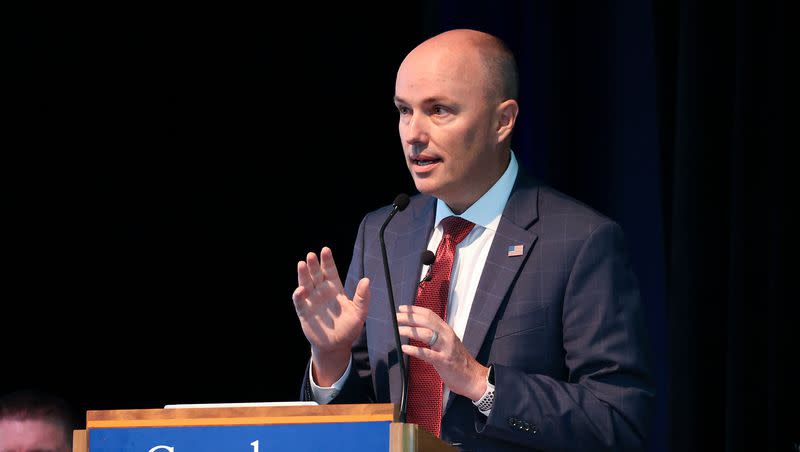Poll: Utah Gov. Spencer Cox continues to enjoy strong approval rating

- Oops!Something went wrong.Please try again later.
Utah Gov. Spencer Cox continues to enjoy consistent support from Utah voters across the board.
In the latest Deseret News/Hinckley Institute of Politics poll, 63% of voters surveyed approve of Cox as governor, which shows almost no change over the last six months. In December, his approval rating was at 63%; in May, it was 64%.
Roughly 28% say they disapprove and 10% don’t know, which also tracks with the last six months of polling.

“It’s great to have the confidence of the majority of Utahns. Gov. Cox remains committed to working hard for Utah families, keeping our economy strong and securing our future. We’re pleased that Utahns recognize and approve of his tireless efforts to keep Utah the best state in the nation,” said Jennifer Napier-Pearce, a spokesperson for the governor.
Dan Jones & Associates surveyed 801 registered Utah voters from June 26 to July 4. The poll has a margin of error of plus or minus 3.46 percentage points and a confidence level of 95%.
Related
The governor’s approval rating among Republicans has stayed consistent in the last six months — the June poll puts him at 66% among GOP voters, just a 2% decrease since May. Meanwhile 43% of Democrats support the governor, down from 54%.
“One of the more interesting things, and it’s what Governor Cox will be most interested in as well, is how he’s doing among the Republicans he needs to show up and vote,” said Jason Perry, director of the University of Utah’s Hinckley Institute of Politics. “... You may see fluctuations inside the category of whether people think they’re moderate or conservative, but really it’s that overall number that is most critical for him.”
When broken down along political ideology, the data tells a similar story.
Between December and May, Cox signed the country’s first and most restrictive social media laws into place aimed at curbing teen use, a bevy of water-related bills, at least 10 laws intended to wrangle Utah’s rapid growth, a law that further limits access to abortion in the state and three bills directed at LGBTQ children — one which places a moratorium on puberty blockers and cross-sex hormones for minors.
During that time frame, the governor lost support among liberals, and gained popularity with his moderate and conservative constituents, according to polling. Support among “somewhat liberal” voters went from nearly 75%, the highest of any group, to 55%. And his approval rating with moderates shot up from 60% to 78%.
Since May there has been less legislative action, and less movement in his approval rating — according to the most recent poll, support among very conservative voters is at 64%, 73% for somewhat conservative, 57% for somewhat liberal and 23% for very liberal.
“It’s a very quiet time where you get to see where people are. And this will change, and these polling numbers will change as they always do, when there are major stories or when the legislative session starts,” said Perry, noting that the upcoming presidential race could have some impact on Cox’s approval rating.
“The person that becomes the Republican nominee is going to have an impact, not just on the numbers for Governor Cox when he runs, but also for the people who are running for any office in the state of Utah,” Perry said.
While support among voters who identify as moderates appears to be slipping — 61% said they approve of the job Cox is doing, a 17% decrease from May — experts caution drawing conclusions from that single data point.
“Overall, the story is that Governor Cox continues to enjoy strong approval ratings. A solid majority of Utahns seem to like the work he is doing. So then the question is what to make of the moderates,” said Chris Karpowitz, co-director of the Center for the Study of Elections and Democracy at Brigham Young University.
The decline among moderates could be concerning for Cox, who is often characterized as a moderate himself. But Karpowitz says it’s too soon to tell if that’s part of a larger pattern.
“It’s not clear that it’s a trend, we would need to see evidence of sustained decline over multiple surveys to really be confident that it is,” Karpowitz said, noting that it’s possible the 17% decline is an outlier. Plus, a voter’s definition of a moderate is subjective and can change based on current events.
Though it could cause his approval rating to slip, Cox losing support among moderates doesn’t necessarily impact his electability given the Republican Party’s grip on Utah politics, Karpowitz says.
“I’m not sure it’s critical. He can win reelection with just conservatives...but his brand, at least stylistically, is more moderate. It’s a different kind of Republicanism than we have seen from the current front runners in national Republican politics. It’s a style of politics that explicitly values an attempt to empathize with and understand people who are on the other side of the political spectrum,” he said.
